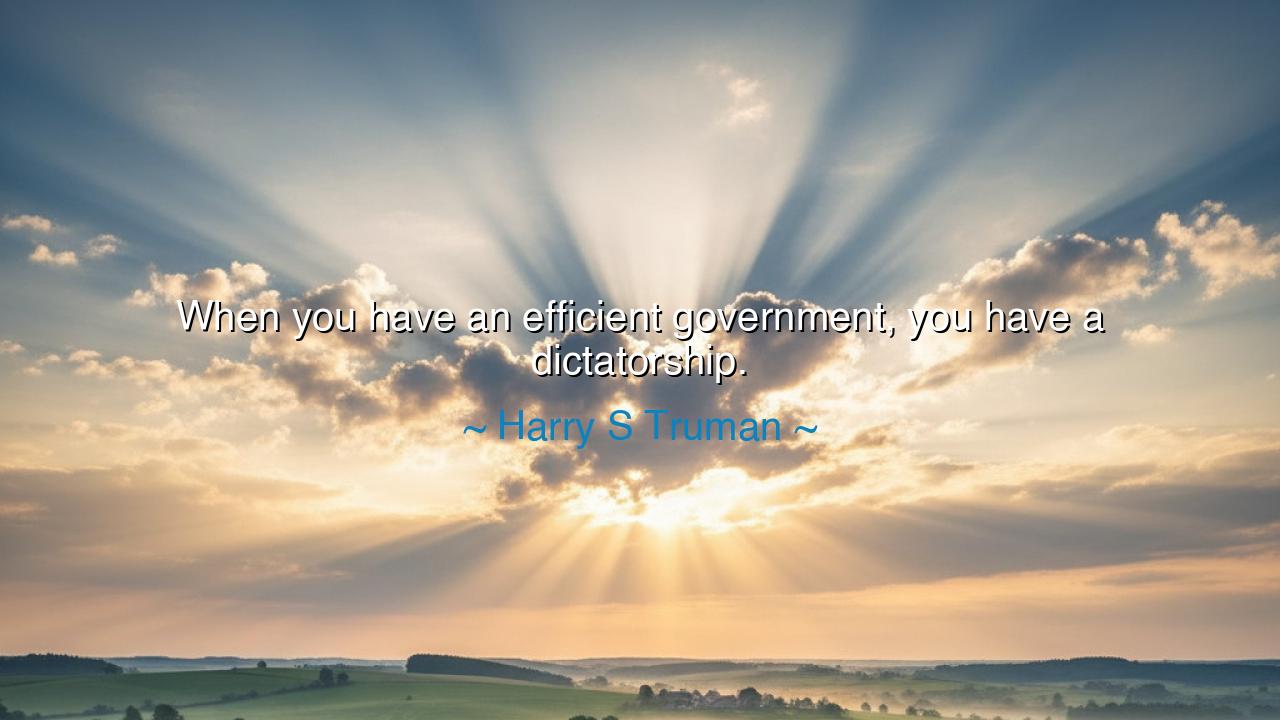
When you have an efficient government, you have a dictatorship.






"When you have an efficient government, you have a dictatorship." Thus spoke Harry S. Truman, a man who had known the cost of power, who had seen both the strength and peril of authority. His words cut deep into the heart of political philosophy, for they unveil a paradox — that efficiency, though often praised as a virtue, may conceal the shadow of tyranny. In those few words, Truman speaks not only as a president but as a guardian of liberty, warning future generations that freedom is often sacrificed not through malice, but through the seductive call of order and control.
Truman lived through an age of upheaval — two world wars, the dawn of the atomic age, and the rise of totalitarian regimes that promised progress and prosperity through efficiency. He had witnessed how the machinery of government, when stripped of restraint, could turn swiftly into an engine of oppression. In the Soviet Union, he saw the iron discipline of the state, where decisions were made swiftly, policies executed ruthlessly, and dissent silenced efficiently. In Nazi Germany, he saw the same — trains ran on time, bureaucracy was flawless, and yet behind that façade of order lay horror. To Truman, efficiency without accountability was not the sign of good governance, but the death knell of democracy.
The meaning of Truman’s warning is profound: democracy is not meant to be efficient — it is meant to be free. A government that moves too quickly, that acts without deliberation, bypasses the very process that protects the people’s voice. In a free republic, laws are debated, votes are counted, arguments are heard, and compromises are forged. It is slow, messy, and often frustrating — but in that friction lies the safeguard of liberty. For every delay, every disagreement, every clash of opinion ensures that no single hand, however noble it claims to be, can rule without question.
History bears witness to this eternal truth. Consider ancient Rome, once a republic governed by the will of its citizens. In times of crisis, the people cried out for efficiency — for swift decisions, strong leaders, and an end to debate. And thus they gave rise to Julius Caesar, who promised to act without delay, to bring stability through power. For a time, Rome prospered — but its freedom died. The dictatorship that followed brought order, but at the cost of the republic’s soul. The Senate became a hollow formality; the people, once sovereign, became subjects. What was efficient became eternal — and what was free, was lost.
Truman understood that democracy’s strength lies not in its speed, but in its restraint. An efficient government is one that silences opposition, eliminates obstacles, and moves as a single will — but such unity can only come through fear or obedience. A free government, by contrast, is a chorus of many voices — some discordant, some harmonious, but all essential. True liberty thrives not in perfect order, but in the tension between differing hearts and minds. To desire efficiency above all is to invite tyranny, for efficiency demands submission, and submission is the enemy of freedom.
His warning is also a mirror for our own age. In times of anxiety — when people fear disorder, when crises arise, when the world seems uncertain — there is always a temptation to trade freedom for control. “Let the experts decide,” some will say. “Let the government act without delay.” Yet every such surrender, however small, strengthens the hand of authority and weakens the spirit of the people. The path to dictatorship does not begin with cruelty — it begins with convenience. And by the time the people realize what they have lost, their rights have already been drowned in the smooth, silent flow of efficiency.
The lesson of Truman’s wisdom is this: guard the sacred slowness of democracy. Cherish its arguments, its imperfections, its noise and its struggle. For in those imperfections lies the beating heart of liberty. A free people must learn patience; they must understand that the purpose of government is not to act swiftly, but to act justly. And justice, like truth, requires time. Be wary, then, of any leader who promises to make everything run smoothly, for he may soon decide that the people themselves are the greatest inefficiency of all.
So remember the words of Harry S. Truman, forged in the furnace of history: “When you have an efficient government, you have a dictatorship.” Let those words echo as both warning and guide — that freedom’s greatest defense lies not in perfection, but in participation. Let us be slow if slowness means wisdom, divided if division means truth, and inefficient if inefficiency means liberty. For the price of freedom is patience, and the reward of patience is the unbroken soul of a free and sovereign people.






AAdministratorAdministrator
Welcome, honored guests. Please leave a comment, we will respond soon